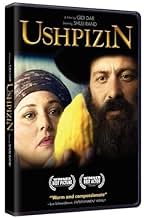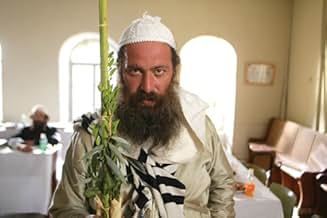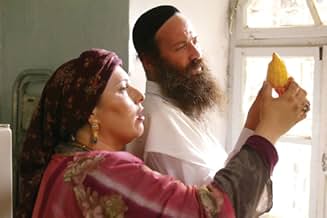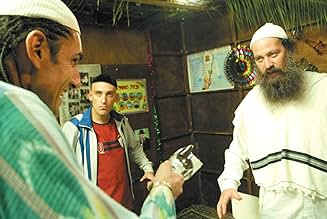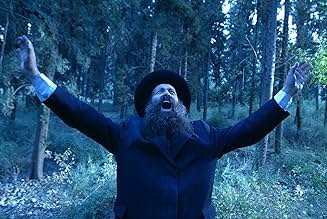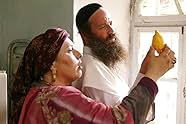IMDb RATING
7.3/10
2.2K
YOUR RATING
An Orthodox Jewish couple's faith is tested after praying to the Lord for a child on the Succoth holiday.An Orthodox Jewish couple's faith is tested after praying to the Lord for a child on the Succoth holiday.An Orthodox Jewish couple's faith is tested after praying to the Lord for a child on the Succoth holiday.
- Awards
- 1 win & 4 nominations total
Daniel Dayan
- The Rabbi
- (as Rabbi Daniel Dayan)
Michael Weigel
- Ethrog Assessor
- (as Michael Vaigel)
- Director
- Writer
- All cast & crew
- Production, box office & more at IMDbPro
Featured reviews
"Sad to be all alone in the world" WIthout children there is no laughter.... so starts the struggle of a Baal Tshuvah (returnees to Judaisn) family in Israel in the huge Breslower chassidic community. Moshe Balanga is struggling to put food on the table, although it is never explained WHY he doesn't work, he comes home dejected on the eve of the holiday of Sucot only to be told by his wife that his faith is lacking and that he should pray harder. Ushpizen is a look at the guarded frum (religious) community from the inside. No compromises of nudity, sex, violence, foul language are needed to tell this sweet, fast paced, emotional story. I saw it with a mostly Jewish audience, but sat next to a non jew who enjoyed it as much as I did. For all ages, for all walks of life.... You will cry, and you will laugh, and you will cheer when it is over. I can't wait to see it again, I suggest you run to see it when it hits national release in September.
"Ha Ushpizin" is like a cross between Isaac Bashevis Singer and O. Henry stories brought to life in contemporary Jerusalem.
Set just before and during the fall harvest festival of Succoth, it is a modern retelling of the story from Genesis and its accompanying Midrash (extra-Biblical story) of Abraham encouraging guests (the title in Aramaic) to his house, that has become a mitzvah (obligation) for holidays. It is a thoroughly charming story of faith and love - and how maintaining both is a daily struggle requiring patience and humor and can even replace therapy.
What makes the film so involving emotionally is the superb acting. In Q & A at the Tribeca Film Festival the Orthodox writer/star and secular director explained they came up with the film, which was inspired by an actual incident that is used as a plot point, and worked diligently to get rabbinical approval by meeting certain restrictions, in order to put a human face behind the head coverings and beards of the Ultra Orthodox in Israel to help ease the tensions between their community ("the Hats" as they are called in short hand) and the majority secular citizens of Israel.
Shuli Rand was a leading film and theater actor before he gave up a secular life for a religious one, much as his character has only been religious for a few years after a somewhat shady past that in the film literally comes back to haunt him. His wife and co-star Michal Bat-Sheva Rand had been a theater director in her past and only agreed to act in this film as that was one of the rabbi's requirements for approval; a story about a couple had to be portrayed by an actual married pair. Practically swaddled burkha-like and almost as wide as she is tall, she unpredictably dominates the screen and takes it above any other more anthropological film about traditional families from any part of the world.
The modern sociological examinations are limited to having the only secular characters in the film be somewhat stereotyped; the kindliest one can say about them is that they are like citizens of Chelm or descendants of Vladimir and Estragon when they are comic relief or a menacing Laurel and Hardy.
There is some gentle clear-eyed look at the Ultra Orthodox as not serving in the Army and living only on charity that they mostly collect like Hare Krishnas in the street or from guilt-ridden Modern Orthodox businessmen that is then distributed based on the internal politics of their affiliated yeshiva.
I also have qualms about prayer being used for such personal propitiation as the couple do here, but that aspect is directed so delightfully and heartwarmingly that it's Scrooge-like to complain.
The visuals of the community of Mea Shearim, the Ultra-Orthodox Jerusalem neighborhood where the film is set, with the temporary Succoth (booths for outdoor eating) set up throughout of various materials, are marvelous views that outsiders rarely get to see.
When it is released in Fall 2005 in the U.S. (with special screenings set up for the Hassidic communities that cannot attend secular theaters with mixed audiences) I doubt viewers will get to participate in the kind of lively and colorful audience I did at the Museum of Jewish Heritage which included almost every possible age and affiliation of New York Jews, particularly from Brooklyn, and some non-Jewish out-of-towners in for the Festival.
But all the Orthodox attendees wanted to know was how the secular director could not be inspired to take the pledge, as it were, after making such a film? He pointed out that his sound designer was so inspired - who stood up to much cheering from many in the crowd.
Set just before and during the fall harvest festival of Succoth, it is a modern retelling of the story from Genesis and its accompanying Midrash (extra-Biblical story) of Abraham encouraging guests (the title in Aramaic) to his house, that has become a mitzvah (obligation) for holidays. It is a thoroughly charming story of faith and love - and how maintaining both is a daily struggle requiring patience and humor and can even replace therapy.
What makes the film so involving emotionally is the superb acting. In Q & A at the Tribeca Film Festival the Orthodox writer/star and secular director explained they came up with the film, which was inspired by an actual incident that is used as a plot point, and worked diligently to get rabbinical approval by meeting certain restrictions, in order to put a human face behind the head coverings and beards of the Ultra Orthodox in Israel to help ease the tensions between their community ("the Hats" as they are called in short hand) and the majority secular citizens of Israel.
Shuli Rand was a leading film and theater actor before he gave up a secular life for a religious one, much as his character has only been religious for a few years after a somewhat shady past that in the film literally comes back to haunt him. His wife and co-star Michal Bat-Sheva Rand had been a theater director in her past and only agreed to act in this film as that was one of the rabbi's requirements for approval; a story about a couple had to be portrayed by an actual married pair. Practically swaddled burkha-like and almost as wide as she is tall, she unpredictably dominates the screen and takes it above any other more anthropological film about traditional families from any part of the world.
The modern sociological examinations are limited to having the only secular characters in the film be somewhat stereotyped; the kindliest one can say about them is that they are like citizens of Chelm or descendants of Vladimir and Estragon when they are comic relief or a menacing Laurel and Hardy.
There is some gentle clear-eyed look at the Ultra Orthodox as not serving in the Army and living only on charity that they mostly collect like Hare Krishnas in the street or from guilt-ridden Modern Orthodox businessmen that is then distributed based on the internal politics of their affiliated yeshiva.
I also have qualms about prayer being used for such personal propitiation as the couple do here, but that aspect is directed so delightfully and heartwarmingly that it's Scrooge-like to complain.
The visuals of the community of Mea Shearim, the Ultra-Orthodox Jerusalem neighborhood where the film is set, with the temporary Succoth (booths for outdoor eating) set up throughout of various materials, are marvelous views that outsiders rarely get to see.
When it is released in Fall 2005 in the U.S. (with special screenings set up for the Hassidic communities that cannot attend secular theaters with mixed audiences) I doubt viewers will get to participate in the kind of lively and colorful audience I did at the Museum of Jewish Heritage which included almost every possible age and affiliation of New York Jews, particularly from Brooklyn, and some non-Jewish out-of-towners in for the Festival.
But all the Orthodox attendees wanted to know was how the secular director could not be inspired to take the pledge, as it were, after making such a film? He pointed out that his sound designer was so inspired - who stood up to much cheering from many in the crowd.
This movie was great. i am not Jewish, have no Jewish friends, and really no great understanding of the faith. When i saw that i was seeing a movie the director called " deeply about faith", filmed on a totally kosher set and not allowed to be watched on the sabbath, i was preparing my self for a trip worse than Godzilla. But i was blown away. Shuli Rand is totally brilliant. This movie, as far as i am concerned, could be a vehicle for him and i would have loved it. I rarely see an actor that can let people half a world away feel the way they do about the world. I have no idea the real implacatons of the quoth, the holiday that the film takes place around, but i feel the importance just in how the lead actor holds a lemon. I was totally enthralled by this movie. The uplifting, god loving, faith inspiring aspects of film normally slide of my back because they are bad actors with bad scripts. This movie actually got the point of faith across better than i could imagine. What i mean is that Moshle ( Shuli, the lead) prays, and he revieves. Then you see why. A friend accidentally steals something he needs. Is this gods work, or dumb luck? the director and writer never answer, which makes for a much better ending. All i didn't like in the movie were a few simple things like bland direction, poor sense of time and an occasional lack of explanation.
but all and all, this is probably the best religious movie i have seen in quite some time, and i you like character acting above plot twists and effects, see this film.
but all and all, this is probably the best religious movie i have seen in quite some time, and i you like character acting above plot twists and effects, see this film.
This comedy which received Best Picture award from Israeli Critics in 2004 reveals a world that most of us don't know at all the world of pious, ultra-Orthodox Jews in the Jerusalem courtyards that seem to be indifferent to what century or even millennium is passing by. On the eve of the Jewish harvest holiday of Succoth, Moshe and Mali, a devoutly religious but impoverished couple, pray fervently for a miracle that they desperately need for money they need to build a Sukkah for holiday, for "ushpizin" ("holy guests") to share the holiday with, and for the most wonderful miracle of all, for a child they dream of but don't have. A series of unexpected events occur, including the appearance of two "unholy guests" two escaped parolees from Moshe's wild past. Moshe and Mali invited the guests to share the holiday with them, and more unpredictable events would follow...
"Ushpizin" is the first collaborative effort between Israel's religious and secular communities and it features many non-professionals who gave very good performances in the movie. Shuli Rand, the writer-star of the movie and his real life wife, Michal Bat-Sheva Rand played Moshe and Mali, and their chemistry is palpable and real contributing to this thoroughly charming story of faith, love, and devotion.
"Ushpizin" is the first collaborative effort between Israel's religious and secular communities and it features many non-professionals who gave very good performances in the movie. Shuli Rand, the writer-star of the movie and his real life wife, Michal Bat-Sheva Rand played Moshe and Mali, and their chemistry is palpable and real contributing to this thoroughly charming story of faith, love, and devotion.
It's quite hard for me to speak about this film without referring to the context of the delicate balance of relations between religious and non-religious people in Israel. This film is made mostly by religious people, and the whole story is told from the perspective of the deep believers. Jewish religious Jerusalem looks beautiful in this film, and it's no better moment to put it on screen than the festival of Succot. Still, the world and life of the religious people in Israel is much more complicated, and the problems they face are quite different, but this is not what this story is about.
What this is indeed about is about what does influence our lives. The main characters are a born-again Jew and his wife, living at the brink of their resources a life of devotion and religious studies. Many things happen to them in the few days before and during the holiday, and these can be explained as miracles dictated by God, or by circumstances of hazard. Of course, the characters are true believers, they speak to God, and know that God rewards them or punishes them for their deeds, but is not this the result of their imagination derived from their deep belief? The director makes for most of the film no comment and lets the viewers decide by themselves. Only by the end, in the last minutes he decides to become explicit, and this is a mistake in my opinion. The kind of Hollywood style ending adopted by this film is sometimes called 'Deus ex machina' and never was the name more appropriate.
Acting is wonderful, both of the religious people looking like characters descending directly from Bashevis Singer's books, as well as the non-religious ones, although their characters are closer to stereotypes. The film was originally made for TV, I believe, with a small budget, it still is true and sincere and funny in many moments. I am looking forward to see how it will be received by the North American audiences.
What this is indeed about is about what does influence our lives. The main characters are a born-again Jew and his wife, living at the brink of their resources a life of devotion and religious studies. Many things happen to them in the few days before and during the holiday, and these can be explained as miracles dictated by God, or by circumstances of hazard. Of course, the characters are true believers, they speak to God, and know that God rewards them or punishes them for their deeds, but is not this the result of their imagination derived from their deep belief? The director makes for most of the film no comment and lets the viewers decide by themselves. Only by the end, in the last minutes he decides to become explicit, and this is a mistake in my opinion. The kind of Hollywood style ending adopted by this film is sometimes called 'Deus ex machina' and never was the name more appropriate.
Acting is wonderful, both of the religious people looking like characters descending directly from Bashevis Singer's books, as well as the non-religious ones, although their characters are closer to stereotypes. The film was originally made for TV, I believe, with a small budget, it still is true and sincere and funny in many moments. I am looking forward to see how it will be received by the North American audiences.
Did you know
- TriviaShuli Rand had two conditions for making this movie, both were met. The first was that his real-life wife, Michal Bat-Sheva Rand, would play his wife in the film. The second is that in Israel the film would not be screened on the Jewish Sabbath.
- Quotes
[from trailer]
Narrator: They worked out of luck, out of hope. And faith was all they had to hang on to. But on this holy week, where guests are considered a blessing, these two unexpected visitors bring with them: a secret from the past. A secret that would test their love and challenge their faith. Now only a miracle will turn their fortune around.
- ConnectionsFeatured in Sharon Amrani: Remember His Name (2010)
Details
- Release date
- Country of origin
- Official site
- Languages
- Also known as
- Holy Guests
- Filming locations
- Production company
- See more company credits at IMDbPro
Box office
- Gross US & Canada
- $1,400,666
- Opening weekend US & Canada
- $64,423
- Oct 23, 2005
- Gross worldwide
- $1,565,016
Contribute to this page
Suggest an edit or add missing content





